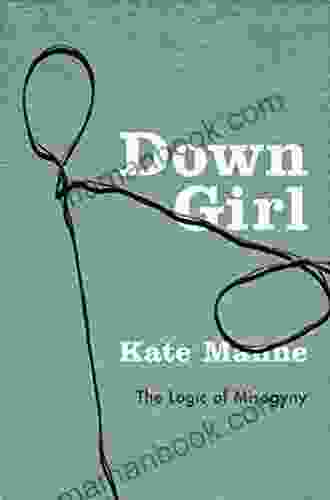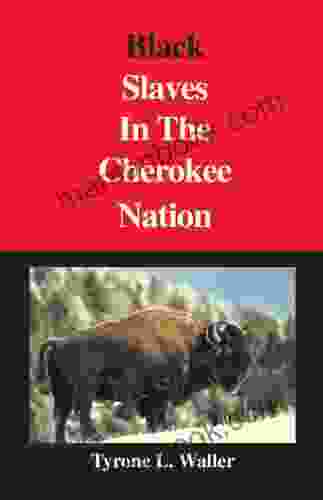The Forgotten History of Black Slavery in the Cherokee Nation

The history of slavery in the United States is often told from the perspective of the white slave owners and the African slaves they held in bondage. However, the story of slavery is more complex than that. There were many different groups of people who were enslaved in the United States, including Native Americans.
One of the most overlooked groups of enslaved people in American history are the black slaves who were held by the Cherokee Nation. The Cherokee were one of the largest and most powerful Native American tribes in the Southeast. They lived in a territory that stretched from what is now Georgia to Tennessee.
4.4 out of 5
| Language | : | English |
| File size | : | 165 KB |
| Text-to-Speech | : | Enabled |
| Screen Reader | : | Supported |
| Enhanced typesetting | : | Enabled |
| Word Wise | : | Enabled |
| Print length | : | 20 pages |
| Lending | : | Enabled |
Like many other Native American tribes, the Cherokee owned slaves. However, the Cherokee system of slavery was different from the system of slavery that existed in the white South. Cherokee slaves were not considered property, and they had some rights under Cherokee law.
Despite the differences between Cherokee slavery and white slavery, the fact remains that black people were enslaved by the Cherokee Nation. This is a history that has been largely forgotten, but it is a history that needs to be told.
The Origins of Black Slavery in the Cherokee Nation
The first black slaves in the Cherokee Nation were brought to the territory by white traders in the early 18th century. These slaves were mostly from Africa, but some were also from other parts of the Americas.
The Cherokee quickly adopted the institution of slavery. They used slaves to work on their farms, hunt, and do other tasks. Slaves were also used as a form of currency. Cherokee families often traded slaves with each other, and they also sold slaves to white traders.
The number of black slaves in the Cherokee Nation grew rapidly in the 18th and 19th centuries. By the early 19th century, there were more than 4,000 black slaves in the Cherokee Nation. This made the Cherokee one of the largest slaveholding tribes in the Southeast.
The Life of a Black Slave in the Cherokee Nation
The life of a black slave in the Cherokee Nation was harsh. Slaves were forced to work long hours in the fields, and they were often beaten or punished for even minor offenses. Slaves were also denied basic rights, such as the right to own property or to marry.
However, there were some differences between Cherokee slavery and white slavery. Cherokee slaves were not considered property, and they had some rights under Cherokee law. For example, slaves could testify in court, and they could own property.
Despite these differences, the fact remains that black people were enslaved by the Cherokee Nation. This is a history that has been largely forgotten, but it is a history that needs to be told.
The Cherokee Slave Trade
The Cherokee were active participants in the slave trade. They traded slaves with other Native American tribes, and they also sold slaves to white traders. The Cherokee slave trade was a major source of income for the tribe.
The Cherokee slave trade took place in a variety of ways. Sometimes, the Cherokee would raid other tribes and capture slaves. Other times, they would buy slaves from white traders. The Cherokee also traded slaves with other Native American tribes.
The Cherokee slave trade was a brutal business. Slaves were often packed into crowded ships and transported long distances. Many slaves died during the journey.
The End of Slavery in the Cherokee Nation
The Cherokee slave trade was finally abolished in 1866, after the Civil War. The United States government forced the Cherokee to free their slaves.
The end of slavery was a major change for the Cherokee Nation. The Cherokee had to find new ways to work their farms and do other tasks that had been done by slaves.
However, the end of slavery also brought new opportunities for the Cherokee. The Cherokee were able to develop a more democratic and just society.
The Legacy of Black Slavery in the Cherokee Nation
The legacy of black slavery in the Cherokee Nation is complex and controversial. Some Cherokee people deny that the tribe ever owned slaves. Others acknowledge that the Cherokee owned slaves, but they argue that Cherokee slavery was not as harsh as white slavery.
There is no doubt that black people were enslaved by the Cherokee Nation. This is a history that has been largely forgotten, but it is a history that needs to be told.
The Cherokee experience with slavery is a reminder that all Americans, regardless of their race or ethnicity, have been affected by the legacy of slavery. It is a history that we must never forget.
4.4 out of 5
| Language | : | English |
| File size | : | 165 KB |
| Text-to-Speech | : | Enabled |
| Screen Reader | : | Supported |
| Enhanced typesetting | : | Enabled |
| Word Wise | : | Enabled |
| Print length | : | 20 pages |
| Lending | : | Enabled |
Do you want to contribute by writing guest posts on this blog?
Please contact us and send us a resume of previous articles that you have written.
 Top Book
Top Book Novel
Novel Fiction
Fiction Nonfiction
Nonfiction Literature
Literature Paperback
Paperback Hardcover
Hardcover E-book
E-book Audiobook
Audiobook Bestseller
Bestseller Classic
Classic Mystery
Mystery Thriller
Thriller Romance
Romance Fantasy
Fantasy Science Fiction
Science Fiction Biography
Biography Memoir
Memoir Autobiography
Autobiography Poetry
Poetry Drama
Drama Historical Fiction
Historical Fiction Self-help
Self-help Young Adult
Young Adult Childrens Books
Childrens Books Graphic Novel
Graphic Novel Anthology
Anthology Series
Series Encyclopedia
Encyclopedia Reference
Reference Guidebook
Guidebook Textbook
Textbook Workbook
Workbook Journal
Journal Diary
Diary Manuscript
Manuscript Folio
Folio Pulp Fiction
Pulp Fiction Short Stories
Short Stories Fairy Tales
Fairy Tales Fables
Fables Mythology
Mythology Philosophy
Philosophy Religion
Religion Spirituality
Spirituality Essays
Essays Critique
Critique Commentary
Commentary Glossary
Glossary Bibliography
Bibliography Index
Index Table of Contents
Table of Contents Preface
Preface Introduction
Introduction Foreword
Foreword Afterword
Afterword Appendices
Appendices Annotations
Annotations Footnotes
Footnotes Epilogue
Epilogue Prologue
Prologue Sarah Gailey
Sarah Gailey By S Bunny Goodman
By S Bunny Goodman Tarin Lex
Tarin Lex Mary Devey
Mary Devey Sheila Lamb
Sheila Lamb Emma Slate
Emma Slate Ann Nocenti
Ann Nocenti Dave Grossman
Dave Grossman Nolan L Cabrera
Nolan L Cabrera Amanda M Lee
Amanda M Lee Dan Michaels
Dan Michaels Roxanne Riley
Roxanne Riley Carl Sandburg
Carl Sandburg Monica Eriksson
Monica Eriksson Natalia Long
Natalia Long Savannah Kade
Savannah Kade Ed Gaulden
Ed Gaulden Carter Godwin Woodson
Carter Godwin Woodson Maria Baes
Maria Baes Lee Child
Lee Child
Light bulbAdvertise smarter! Our strategic ad space ensures maximum exposure. Reserve your spot today!

 Fernando PessoaTempted, Twisted, Tamed: The Dark Protectors Novellas - A Captivating Journey...
Fernando PessoaTempted, Twisted, Tamed: The Dark Protectors Novellas - A Captivating Journey...
 Amir SimmonsMounted by Monsters: A Captivating Sci-Fi Romance Exploring the Boundaries of...
Amir SimmonsMounted by Monsters: A Captivating Sci-Fi Romance Exploring the Boundaries of... Gavin MitchellFollow ·7.7k
Gavin MitchellFollow ·7.7k Tim ReedFollow ·2k
Tim ReedFollow ·2k Angelo WardFollow ·11.4k
Angelo WardFollow ·11.4k Carter HayesFollow ·10.8k
Carter HayesFollow ·10.8k David PetersonFollow ·10.3k
David PetersonFollow ·10.3k Ralph TurnerFollow ·15.6k
Ralph TurnerFollow ·15.6k Phil FosterFollow ·4.8k
Phil FosterFollow ·4.8k Travis FosterFollow ·7.2k
Travis FosterFollow ·7.2k

 Ernest Powell
Ernest PowellBenefits of Corporal Punishment: A Review of the...
Corporal punishment is a form of physical...

 Bobby Howard
Bobby HowardThe Development and Significance of African American...
African American...

 Guy Powell
Guy PowellDown Girl: The Logic of Misogyny - A Comprehensive...
In her groundbreaking work,...

 Forrest Blair
Forrest BlairThe Bikini Changing Room: A Micro Mini Romance
In the heart of...
4.4 out of 5
| Language | : | English |
| File size | : | 165 KB |
| Text-to-Speech | : | Enabled |
| Screen Reader | : | Supported |
| Enhanced typesetting | : | Enabled |
| Word Wise | : | Enabled |
| Print length | : | 20 pages |
| Lending | : | Enabled |












